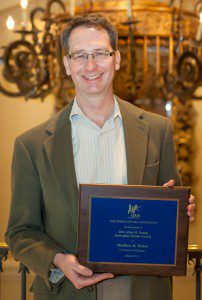
Award Recipient
Matthew D. Weber (University of Michigan)
Award Committee Assessment
Mr. Weber is a doctoral candidate in the Ph.D. Program in Urban and Regional Planning, and he is completing a dissertation entitled “Informal Property Ownership and Shrinking Cities: Causes, Consequences, and Policy Options” (under Margaret Dewar (chair), Richard Norton, Martin Murray, and Trina Shanks). Mr. Weber holds a Bachelor of Arts in Philosophy from the University of Michigan, and a Masters of Arts in Public Affairs and Policy Analysis and Juris Doctorate from the University of
Wisconsin.
Committee members note that Mr. Weber’s dissertation prospectus is sound, outstanding and quite innovative; that Mr. Weber organized scholarly activities around the Detroit School Theory, indicating a future major contribution to scholarship; and that Mr. Weber was the Co-Instructor of the Integrative Field Experience class and the Primary Instructor of the Neighborhood Planning class. His nominator, Dr. Margaret Dewar, notes that “Weber is an exceptionally strong Ph.D. student, the best I have advised or with whom I have interacted in classes from any discipline. He is a very clear, logical thinker. His analysis of literature is excellent. He is an excellent writer. He is articulate in speaking about his ideas so that he excites others about the work he is doing.”
Weber is studying “legacy cities”, those cities that came of age amidst the Fordist mode of production and which today struggle with a diminished tax base, population loss, vacant and abandoned properties, crime, poverty, and low educational attainment. His dissertation makes use of the unique research opportunities legacy cities afford: how their scope and scale of decline brings to light phenomena that may be more difficult to observe in growing cities, in turn building a deeper understanding of urban processes and exposing gaps in urban theory and mismatches between policies presuming growth and places dominated by population loss and weak real estate markets.
Weber argues that the emptied out neighborhoods, concentrated poverty and diminished property values in legacy cities work to break down the legal, economic, social and spatial mechanisms that ordinarily reproduce formal property ownership. The result, absent the right policy responses, is widespread informal ownership. Based on this insight, Weber makes innovative use of theory, integrating literature on informal settlements in the global South with the literature on shrinking cities to draw parallels between similar processes unfolding in very different contexts. This is a fascinating approach to the (longstanding and seemingly intractable) problems legacy cities face. Moreover, Dr. Dewar notes “[…] little careful scholarship exists on exactly what places become after prolonged, extreme population loss and property disinvestment or on what mechanisms make a difference in what such places become […].” She continues to note that Weber is “documenting the extent of informal ownership and its spatial distribution and has so far found, for instance, that in areas of the city with only 10 to 30 percent of the peak number of households, squatters have taken over almost 10 percent of properties. […] If informal property ownership is widespread in heavily disinvested areas of declining cities, this has profound implications for the futures of such cities and for the low-income residents of the most disinvested places.”
As his advisor notes, “Matthew is already building a scholarly community around legacy city research through organizing the Detroit School series. This series asks how studying Detroit and cities like it changes the questions we ask and answers we find in urban scholarship, and brings together participants from departments as varied as history, anthropology, sociology, economics, public policy, urban planning and political science. He is also deeply engaged as an educator, speaking perceptively in his personal statement of the emotional aspects of teaching about legacy cities, arguing they encourage a deeper engagement with the material.” In conclusion, the Committee has no doubt that Alma Young would be proud of this emerging scholar. His work honors the legacy of Alma Young, and promises to chart an exciting path forward in urban affairs.
Award Committee
Chair Katrin B. Anacker (George Mason University); Kenya Covington (California State University, Northridge); Desiree Fields (City University of New York); Donald Rosdil (Towson University); Robert Silverman (University at Buffalo)





